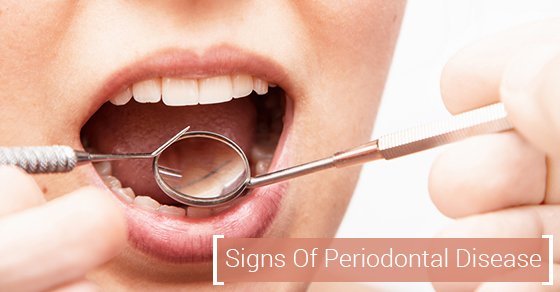Good oral hygiene isn’t just about our teeth, but also about taking great care of our gums. Neglecting oral health can lead to gum disease, which if left untreated can become serious.
Gum disease is very common, in fact, most adults have or have had it. It can be mild inflammation, or can be more serious, causing sore, swollen gums. If gum disease is caught early, it is easy to stop it from happening.
Gum disease is caused by a buildup of plaque on the teeth. Plaque, a sticky substance, contains bacteria that can lead to gum infection and cause inflammation. It’s important to prevent plaque buildup by brushing at least twice daily, flossing every day, and seeing your dentist for regular check-ups and cleaning.
Mild gum disease is called Gingivitis. If it progresses, it can turn into Periodontitis and affect more of the soft tissues in your mouth, even resulting in tooth loss and damage to the jawbone. It is important to recognize the following signs of periodontal disease so that you can treat it before it worsens.
- InflammationDiseased gums may become swollen, red, and sore or tender to the touch.
- Bleeding GumsGums that bleed when you brush your teeth are another common symptom of gum disease.
- Bad BreathEveryone has less-than-fresh breath once in awhile, but if you’re finding you have chronic bad breath it may be a sign of gum disease.
- Loose Or Sensitive TeethPeriodontitis can cause gums to recede from the teeth, forming pockets, or spaces, between the tooth and gum. Another sign of this is a receding gum line, which will cause your teeth to appear longer. These are all very severe symptoms of periodontitis, ones that should lead you to consult a dentist immediately.
- PainWith Gingivitis and Periodontitis, your gums and teeth may feel sore or sensitive to the touch. In addition, actions like chewing can become painful. If you’re feeling any kind of oral pain you should consult a dentist right away.
It’s important to bear in mind that more severe gum disease doesn’t typically occur until you’re in your 30’s or 40’s, with men being more prone to it. The best thing you can do is take preventative measures by making sure you have excellent oral hygiene, and making regular visits to the dentist. However, should any of the above symptoms arise, it’s best to consult your dentist as soon as you can.
